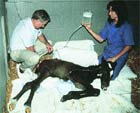The ethical debate
Drs. Bernard Rollin and Joseph J. Bertone explore the ethical debate surrounding use of pirated products.
Pirated drugs are becoming more commonplace in veterinary medicine. Although this is especially true in equine medicine, it has permeated all aspects of clinical medicine. Veterinarians are substituting drugs approved by the U.S. Food and Drug Administration (FDA) with inferior products that make claims that they are generic equivalents to brand name drugs. These claims are untrue and misleading to owners and trainers. This issue also presents new challenges for the equine practitioner in discussing the issue with his or her clients. How do you effectively discuss the subject without causing a potential rift with clients?
This article examines this ethical dilemma, and it answers how to effectively communicate with clients about the impact of pirated drugs on their horses.
Ethical debate
During the past 13 years as an ethicist, I (Rollin) have examined more than 150 ethical issues that have arisen in veterinary medicine, either directly or in the columns I write. While some of these issues represent true dilemmas, with strong arguments that can be marshaled on each side of a given issue, many others are quite straightforward and their ethical resolution is unambiguous.
I cannot think of a better example of an issue with clear ethical resolution than the one facing us in this discussion-the use of pirated drugs -where veterinarians dispense copies of established veterinary drugs. The basic reason that this is a problem is that these drugs compounded from bulk ingredients-unlike the branded (FDA-approved) products or approved U.S. generic equivalents and registered products-do not undergo FDA-approved testing for safety, efficacy and are not produced under conditions that conform to FDA's Good Manufacturing Practices, which include standards for quality, purity, stability, strengths and consistency. In my view, dispensing such drugs, as done by many veterinarians to increase profit well above what they can make with approved drugs, violates every sort of moral obligation inherent in veterinary medical ethics.
Set in law
The Federal Food, Drug and Cosmetic Act (FDCA) stipulates that if a drug is not produced under "good manufacturing" procedures, an assurance of quality, strength, potency, consistency and stability, then the drug is misbranded, adulterated and mislabeled.
FDCA (Sec.501.[351]) states that a drug or device shall be deemed to be adulterated: "if it is a drug and the methods used in, or the facilities or controls used for, its manufacture, processing, packing or holding do no conform to or are not operated or administered in conformity with current good manufacturing practice to assure that such drug meets the requirements of this chapter as to safety and has the identity and strength, and meets the quality and purity characteristics, which it purports or is represented to possess."
This is not just law, but clinically and pharmacologically essential. Unless Good Manufacturing Practices are followed, it is nearly impossible to assure that what a label says is in the formulation is actually in the formulation and will be there for a reasonable period of time (i.e. shelf-life). When one substitutes an approved drug, to be administered by a given route, with a pirated (i.e. counterfeit with the intention of using the substandard product to replace the approved product), then one by definition is applying substandard care.

Ethical obligation: Using untested non-quality controlled drugs violates a veterinarian's obligation to the animal, experts say. Counsel your clients by talking to them candidly about these important issues.
Crossing that gray line
Veterinarians, by virtue of their profession, have moral obligations to clients, animals, peers and the profession, themselves and society in general. A brief examination of each of these categories will manifest that the use of pirated drugs is paradigmatically violative of all aspects of veterinary ethics.
Using untested, non-quality-controlled drugs violates a veterinarian's obligation to the animal patient, because these drugs may be ineffective or even dangerous. For example, CBS reported that in 1995 counterfeit cough medicine was associated with the death of 89 people in Haiti, and counterfeit gentamicin caused 66 deaths and numerous cases of irreversible severe reactions. Since owner and animal interest coincide in treating disease, using counterfeit drugs that may be ineffective or harmful also harms the client, whose interest is in treating a sick animal.
In the same vein, dispensing such medication violates veterinarians' obligations to society under whose aegis veterinarians are chartered as professionals. The Veterinarian's Oath tells us that veterinarians are charged with using their scientific and science-based knowledge to the benefit of society. Insofar as science has shown the inefficacy and dangers of counterfeit drugs, dispensing them violates society's trust in veterinarians, who, in using such drugs, place self-interest over obligation. For precisely the same reason, counterfeit drug use violates a practitioner's obligation to peers and the profession, by eroding public trust in veterinary medicine.
Though such drug dispensing may bring significant profit to the practitioner in the short run, in the long run dispensing these dangerous drugs can erode a clinician's credibility if the drugs in question fail the tests of safety and/or efficacy and this becomes known. A clinician's reputation is too hard-won and precious a commodity to risk it for the sake of greed.
Plain talk
Dealing with the pirated drug issue and your clients may create a number of hurdles to overcome. It is important to have a candid conversation with clients about these products. They need to know pirated drugs are not approved by the FDA and are not regulated by any type of federal, state or medical organization. Although clients and trainers may see the economic value of using pirated drugs, they also need to have a clear vision of the medical ramifications of these products as well.

Biggest benefit: Your patients will benefit the most from owners and trainers understanding the importance of using non-pirated drugs, even though they may be cheaper.
Let's explore a few scenarios.
- Scenario 1: A client comes to you and says, "I want you to use that generic GastrogardTM or VentipulminTM. It's a lot cheaper."
Your response could be: "There are no approved generic formulations of these drugs. Whoever told you that (unfortunately it may have been a veterinarian) misled you. I only use quality products in my practice." Next, you can explain the issue in greater detail.
Identify that the pirated drug is substandard and that you don't practice veterinary medicine in a substandard manner - patient care is paramount. You might even have to discuss the legalities of the problem.
If the client says, "Wow, I didn't know that, thank you doctor, my horse, dog, etc. should have the best, and I would not want you to break the law," then you have won a client you should cherish. If you lose the client because they want the "cheap stuff" and care very little that you put yourself at legal and liability risk, then you have lost a client you did not need. Let them find another practitioner that will dispense a cheap, substandard, illegal drug. They could likely return to your care when they don't get the treatment results they want from someone else.
- Scenario 2: A client comes to you and says, "Why are you using Adequan™ or Legend™ instead of the generic (i.e., Chondrodefect, or MAP5, or LoCoat or NonCell) for use in my horse or dog?" Your response could be: "Those products are topical bandages for wounds or freezer wrap for sperm, and they were never intended to go beneath the skin of any animal." It is important to explain that to use those devices as drugs would imply that you were practicing poor quality medicine and jeopardizing the health of his or her animal. It would also imply that you were more interested in money, then the animal's welfare. Again, do not be afraid to let your client walk in this situation if they disagree with your explanation.
- Scenario 3: A client comes to you and says, "I read how evil it is to use pirated drugs in horses. You are using dipyrone to treat my horse. Is that wrong?"
Your response could be: "There is no approved dipyrone, but it is well accepted that this drug controls high fevers much better than any other drug on the market. If there were an approved form, then the use of compounded dipyrone would be defined as substandard care, but since there is no FDA-approved formulation, the compounded drug is acceptable and clinically intelligent."
These three scenarios are some of the more common situations practitioners may find themselves. It is important to remember not to become defensive and approach each situation as a discussion on the best medicine for the horse or other pet you may be treating. When talking to clients and trainers, it is also critical to reiterate the point that pirated drugs are not FDA approved and their contents and the grade of the material are unknown and treatment outcomes are unpredictable. Taking the high road to high-quality medicine will eliminate any ethical dilemma or haggling over price for a product.
Dr. Rollin is University Distinguished Professor, Professor of Philosophy, Professor of Biomedical Sciences, Professor of Animal Sciences, and University Bioethicist at Colorado State University. Rollin taught the first course ever done in veterinary medical ethics, which has been a required part of the veterinary curriculum at CSU since 1978, and was a pioneer in reforming animal use in surgery teaching and laboratory exercises in veterinary colleges. He is a principal architect of federal legislation dealing with the welfare of experimental animals, and has testified before Congress on animal experimentation. He has consulted for various agencies of the governments of the U.S., Canada, Australia, the Netherlands, New Zealand, and South Africa on many aspects of animal research, for the Office of Technology Assessment of the U.S. Congress on genetic engineering of animals, for NIH on animal pain, and for the World Health Organization on using antimicrobials in food animals. He has consulted for the USDA/CSRS on farm animal welfare research, and for APHIS on future planning.
Rollin has lectured more than 800 times on animal ethics, genetic engineering, animal pain, animal research, animal agriculture, veterinary ethics and other topics in bioethics and philosophy to audiences of medical researchers, attorneys, psychologists, philosophers, veterinarians, animal advocates, ranchers, farmers, government officials, students and lay people in the U.S., Canada, England, Scotland, Italy, Poland, Holland, Australia, New Zealand, Sweden, and South Africa. He is the author of more than 175 papers and 10 books, of which the best known is Animal Rights and Human Morality, which won an Outstanding Book of the Year Award from the American Association of University Libraries.
Dr. Bertone is professor of equine medicine at Western University of Health Sciences College of Veterinary Medicine. He received his DVM and BS degrees (nutrition concentration) from Cornell University (1983). He completed a residency-training program, and a MS degree at Colorado State University. He served on the faculties of Louisiana State University and The Ohio State University, in addition to the Food and Drug Administration Center for Veterinary Medicine. He was recently nominated for the AVMA Council on Biologics and Therapeutic Agents, representing equine practice.